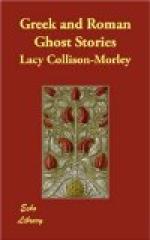Apuleius,[66] in his truly astounding account of Thessaly in his day, gives a detailed description of the process of calling back a corpse to life. “The prophet then took a certain herb and laid it thrice upon the mouth of the dead man, placing another upon the breast. Then, turning himself to the east with a silent prayer for the help of the holy sun, he drew the attention of the audience to the great miracle he was performing. Gradually the breast of the corpse began to swell in the act of breathing, the arteries to pulsate, and the body to be filled with life. Finally the dead man sat up and asked why he had been brought back to life and not left in peace.”
One is reminded of the dead man being carried out to burial who meets Dionysus in Hades, in Aristophanes’ Frogs, and expresses the wish that he may be struck alive again if he does what is requested of him. If ghosts are often represented as “all loath to leave the body that they love,” they are generally quite as loath to return to it, when once they have left it, though whether it is the process of returning or the continuance of a life which they have left that is distasteful to them is not very clear. The painfulness of the process of restoration to life after drowning seems to favour the former explanation.
These cases of resurrection are, of course, quite different from ordinary necromancy—the summoning of the shade of a dead man from the world below, in order to ask its advice with the help of a professional diviner. As religious faith decayed and the superstitions of the East and the belief in magic gained ground, necromancy became more and more common. Even Cicero charges Vatinius[67] with evoking the souls of the dead, and with being in the habit of sacrificing the entrails of boys to the Manes. Tacitus mentions a young man trying to raise the dead by means of incantations,[68] while Pliny[69] speaks of necromancy as a recognized branch of magic, and Origen classes it among the crimes of the magicians in his own day.
After murdering his mother, Nero often declared that he was troubled by her spirit and by the lashes and blazing torches of the Furies.[70] One would imagine that the similarity of his crime and his punishment to those of Orestes would have been singularly gratifying to a man of Nero’s theatrical temperament; yet we are informed that he often tried to call up her ghost and lay it with the help of magic rites. Nero, however, took particular pleasure in raising the spirits of the dead, according to the Elder Pliny,[71] who adds that not even the charms of his own singing and acting had greater attractions for him.




